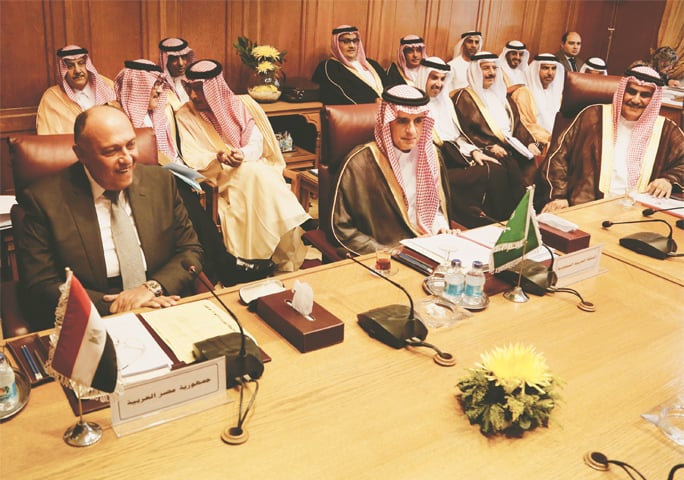
CAIRO: Saudi Arabia on Sunday asked fellow Arab nations to take a “serious and honest” stand against Iran, saying that showing leniency towards Tehran would only encourage it to press on with its “aggression” and “meddling” in the internal affairs of Arab countries.
Addressing a meeting of Arab foreign ministers in Cairo, Saudi Foreign Minister Adel Al-Jubeir said the pan-Arab organisation needed to take a decision to be “non-compromising” in dealing with Iran. He cited a ballistic missile fired by Iranian-backed rebels in Yemen earlier this month that was intercepted near the Saudi capital, Riyadh, as an example of how far Iran has gone with its aggressive policy in the region.
“Showing leniency towards Iran will not leave any Arab capital safe from those ballistic missiles,” he said. “We are obliged today to take a serious and honest stand... to counter these belligerent policies so that we can protect our security,” said Al-Jubeir.
He said his country was targeted by a total of 80 ballistic missiles fired by Yemen’s Iranian-backed Shia rebels since the kingdom in 2015 led a coalition to fight them alongside the internationally recognised government there.
Saudi Arabia, he added, will not stand idly by in the face of Iran’s “blatant aggression.” Arab diplomats said a Saudi draft resolution put forward to the Arab ministers is proposing a declaration of solidarity with the kingdom and stating Arab support for actions it might take to safeguard its national security in the face of Tehran’s policies.
The Saudi draft also includes a warning to Iran against continuing its present policies in the region and orders Arab diplomats to request a meeting of the UN Security Council to discuss what it called Iranian “threats,” added the diplomats.
The draft appears to be in synch with Saudi Arabia’s hardening of its rhetoric against Iran since the Yemeni rebels, known as Houthis, fired that missile on Nov 4. Along with that attack, the resolution cited the bombing of an oil pipeline in Bahrain also this month as an example of Iran’s threat to regional security.
Iran denies arming the Houthis, who say they locally produced the missile.
The Houthis remain in control of Yemen’s capital, Sanaa, and most of the country’s north, while government forces and their allies, backed by the Saudi-led coalition, have driven them out of most of the country’s south.
Syria is another battlefield of the proxy conflict between Shia Iran and Sunni powerhouse Saudi Arabia; Riyadh has been supporting groups fighting forces loyal to President Bashar Assad. Iran, on the other hand, has supported Assad’s government, providing it with billions of dollars’ worth of economic and military aid since the civil war there began in 2011. Lebanon’s Iranian-backed Hezbollah, a Shia guerrilla group, and an assortment of Iranian-linked Shia militias from places like Iraq and Afghanistan, have been fighting on the Syrian government’s side.
The Saudi draft is unlikely to win the support of everyone in the Arab League.
For example, Shia-majority Iraq, bound to Iran by close military and religious ties, is likely to oppose a resolution that condemns or vilifies its neighbour. Lebanon’s Iranian-backed guerrilla group Hezbollah is a key member in Beirut’s government, which makes it unlikely for the country to support an anti-Iranian resolution. Both Iraq and Lebanon were represented by mid-level diplomats in Sunday’s meeting.
Qatar, which has been at loggerheads with Saudi Arabia, partially over its close ties with Iran, is another country unlikely to endorse a resolution that finds Iran guilty of fomenting instability in the region. Saudi Arabia and
its allies Egypt, the United Arab Emirates and Bahrain have been boycotting Qatar since June over allegations that it backs militant Islamic groups and maintaining close ties with Iran.
Published in Dawn, November 20th, 2017
















































Dear visitor, the comments section is undergoing an overhaul and will return soon.